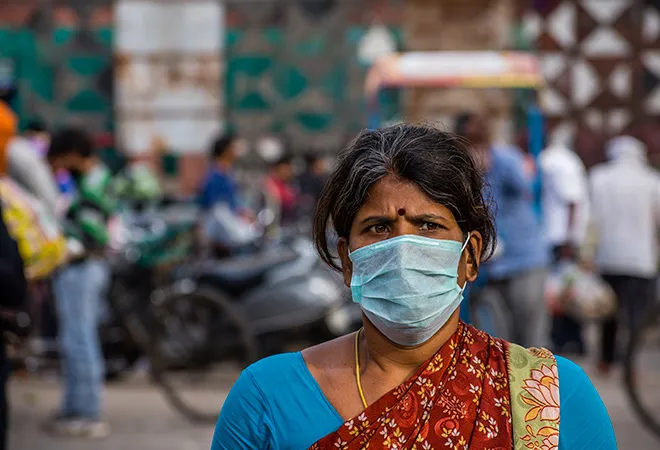
As COVID-19 has presented an unprecedented worldwide health emergency, women across the world have come on the frontlines. The members of women’s SHGs have been playing a key role in the backdrop of the pandemic. In India, there are approximately
69 million women members of around 6.3 million Self Help Groups (SHGs) formed under the Ministry of Rural Development’s Deendayal Antyodaya Yojana-National Rural Livelihoods Mission (DAY-NRLM). With the increased demand for medical facilities, these women have taken up the task of producing medical provisions including masks, personal protective equipment (PPE) and face shields for medical and police personnel, cleaning staff. Apart from this, their decentralised networks have enabled them to provide banking solutions, cooked meals and door-to-door services for the dissemination of accurate information in rural areas.
How SHG women face the challenge
As
reported by the Ministry of Rural Development, around 78,373 SHG members are presently involved in the manufacturing of masks and sanitising provisions. Women SHG members in 27 State Rural Livelihood Missions (SRLMs) have produced around 19.6 million masks, 50,000 litres of hand wash and over 100,000 litres of sanitiser. In
Jharkhand, for instance, SHGs have produced about 78,000 masks and are being sold at the premises of subsidised medical stores and district collectorates at affordable prices. In
Odisha, poor rural women who were initially engaged in stitching school uniforms have switched over to sewing masks and have produced more than one million cotton masks.
Women SHG members in 27 State Rural Livelihood Missions (SRLMs) have produced around 19.6 million masks, 50,000 litres of hand wash and over 100,000 litres of sanitiser.
Several
SHGs have also set up over 10,000 community kitchens across the country to feed informal workers and the vulnerable. In Kerala, the
Kudumbashree network, with 4.4 million members, is delivering free ration and grocery kits in the remote tribal hamlets in the district and is running about 1,300 kitchens around the state.
Women-led SHG in Orissa has set up kitchens in 5,247 gram panchayats and 108 urban local bodies. Moreover, women SHG members, who also work as banking correspondents, known as ‘Bank Sakhis’,
have
continued to provide doorstep banking services to remote areas. They are distributing pensions as well as enabling the most vulnerable to access credits into their accounts through direct benefit transfers (DBT). The work of the SHG members has not only helped in meeting the increased demand for medical provisions, but has also provided the members themselves with some financial relief. The members who were earlier deprived of their daily incomes due to the lockdown are
now able to earn around INR 300-400 per day.
In addition,
1,205 Van Dhan Vikas Kendras (VDVKs) that involve around 18,075 Van Dhan Self Help Groups, have been sanctioned in 27 States and one Union Territory. This includes over 3.6 lakh tribal gatherers in the scheme. A total of 15,000 of these SHGs will be promoted as Van Dhan Social Distancing Awareness cum Livelihood Centres. Through a digital training programme, the SHGs will be equipped to create awareness about social distancing and steps to be followed in the community. They will also suggest practices for maintaining personal hygiene, sanitation and adopting cashless practices.
JEEViKA, a programme spearheaded by the Government of Bihar through the Bihar Rural Livelihoods Promotion Society, has collected more than 100,000 mobile numbers of community members. It is using the Mobile-Vaani platform to release voice messages and is also addressing the community’s queries regarding COVID-19. Moreover, the SRLM in Jharkhand has initiated ‘The Didi’, a telephonic helpline that is open 24 hours to provide verified information to help migrant labourers.
Economic reconstruction
There is an urgent need for economic reconstruction in the post-lockdown period. SHG loans have the potential to facilitate and boost investment or spending. They also provide a safety net to improve resilience during a critical time of need. Such loans enable women to avoid high interest rates and harsh conditions placed on borrowers by banks. It has been observed that women SHGs have a
gross NPA ratio of 4.5 percent, much lower than the industry average. Therefore, it is necessary to keep the SHGs solvent and recapitalise them so that they have adequate liquidity to lend and play their vital role in the recovery process. Under the Pradhan Mantri Gareeb Kalyan Yojana (PMGKY) relief package, Finance Minister Nirmala Sitharaman has
doubled the amount of collateral-free loan to Rs 20 lakh for women SHGs to meet their business requirements. This is likely to provide immediate support to 63 lakh SHGs benefiting 70 million families.
SHG loans have the potential to facilitate and boost investment or spending. They also provide a safety net to improve resilience during a critical time of need.
Beyond the financial scope of SHGs’ outreach, an equally essential dimension to the groups’ importance is the psycho-sociological support that is shared amongst the group members. For instance, in the 2014 Ebola Virus Disease outbreak, the members’ social cohesion was reinforced within the
Village Savings and Loan Associations (VSLA) or SHG and the network at large. The group promoted harmony and solidarity amongst VSLA members. In Liberia, one such member explained that in the aftermath of the death of her family members from Ebola, the group made an exceptional moral, financial and psychological contribution that helped her during the period of extreme grief and loss. In times of crisis such as the present outbreak, SHGs are the most suitable channel for support and established last-mile infrastructure for vulnerable and the excluded populations. SHGs’ extensive decentralised network can help in financial relief through loans and savings, providing emergency funds as well as disseminating relevant information and direction.
The views expressed above belong to the author(s). ORF research and analyses now available on Telegram! Click here to access our curated content — blogs, longforms and interviews.
 As COVID-19 has presented an unprecedented worldwide health emergency, women across the world have come on the frontlines. The members of women’s SHGs have been playing a key role in the backdrop of the pandemic. In India, there are approximately 69 million women members of around 6.3 million Self Help Groups (SHGs) formed under the Ministry of Rural Development’s Deendayal Antyodaya Yojana-National Rural Livelihoods Mission (DAY-NRLM). With the increased demand for medical facilities, these women have taken up the task of producing medical provisions including masks, personal protective equipment (PPE) and face shields for medical and police personnel, cleaning staff. Apart from this, their decentralised networks have enabled them to provide banking solutions, cooked meals and door-to-door services for the dissemination of accurate information in rural areas.
As COVID-19 has presented an unprecedented worldwide health emergency, women across the world have come on the frontlines. The members of women’s SHGs have been playing a key role in the backdrop of the pandemic. In India, there are approximately 69 million women members of around 6.3 million Self Help Groups (SHGs) formed under the Ministry of Rural Development’s Deendayal Antyodaya Yojana-National Rural Livelihoods Mission (DAY-NRLM). With the increased demand for medical facilities, these women have taken up the task of producing medical provisions including masks, personal protective equipment (PPE) and face shields for medical and police personnel, cleaning staff. Apart from this, their decentralised networks have enabled them to provide banking solutions, cooked meals and door-to-door services for the dissemination of accurate information in rural areas.
